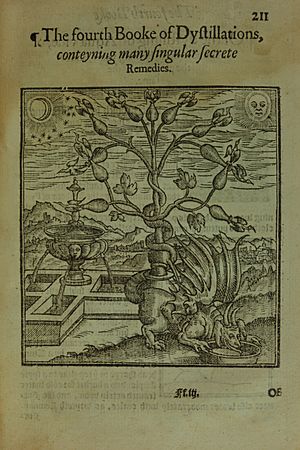George Baker (surgeon) facts for kids

George Baker (born 1540, died 1600) was an English surgeon. He was well-known for writing and translating many important medical books during his time.
Contents
Baker's Career as a Surgeon
George Baker was a member of the Barber Surgeons' Company. This was a special group for surgeons and barbers in London. He was even chosen as the master of this company in 1597.
By 1574, when he published his first book, Baker was working for the Earl of Oxford. Other writers from his time said he was very successful in London. One writer, Banester of Nottingham, praised him in Latin poetry. Another, Clowes, predicted his books would be famous forever. The most important part of his career was serving as the personal surgeon to Queen Elizabeth I.
George Baker's Published Works
Baker's first book was published in 1574. It was called The Composition or Making of the most excellent and pretious Oil called Oleum Magistrale and the Third Book of Galen. A Method of Curing Wounds and of the Errors of Surgeons.
The Newe Jewell of Health
In 1576, Baker published a translation of a book by Conrad Gessner. He called his version The Newe Jewell of Health. This book shared many "excellent secrets" about medicine and philosophy. Baker wrote a good introduction to this book himself. He believed it was important to write about learned subjects in English, not just Latin. He also thought it was fine to translate books freely, not just word for word. He said, "if it were not permitted to translate but word for word, then I say, away with all translations."
Distillation and Medicines
The Newe Jewell talked a lot about the "chemical art." For Baker, this meant the art of distillation. Distillation is a process that purifies liquids. Baker believed that medicines made through distillation were much stronger. He wrote that "three drops of oil of sage doth more profit in the palsie... than one pound of these decoctions not distilled."
Baker did not always fully explain his medical processes. He wanted to make sure that only trained people could use his information. He kept some details secret. He also wrote the names of plants in Latin. He felt this would make readers learn more by looking up the English names. He also didn't want "every ignorant asse to be made a chirurgian by my book." He meant that he didn't want untrained people to try to be surgeons just by reading his book.
Other Important Books
Baker also wrote Antidotarie of Select Medicine in 1579. This was another book about different medicines. He also translated two books about general surgery. These were Guido's Questions (1579) and Vigo's Chirurgical Works (1586). These books had been translated before, but Baker updated them.
In 1584, Baker wrote an essay about quicksilver. This essay was part of a book by his friend Clowes. He also wrote an introduction for the Herball (a book about plants) by his friend John Gerard in 1597. His book about Galen was printed again in 1599. The Jewell was also reprinted with a new title: The Practice of the New and Olde Physicke.
 | Roy Wilkins |
 | John Lewis |
 | Linda Carol Brown |

